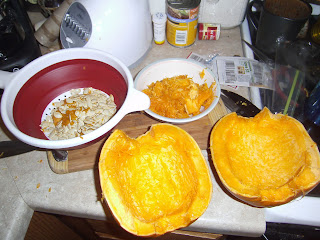Just a quick bit on where I academically come from. My undergraduate major was pre-med/music. I had a healthy mix of technical and non-technical classes. Some people define technical classes as only those that include problems (e.g. chemistry, physics), but I think classes such as biology and music theory fit into that as well. In those classes there is a lot of technical information that has to be learned even though there aren't "problems." This is in contrast with subjects such as women's studies where knowledge is tested primarily through papers and essay questions.
I think that most undergraduate courses fit into the technical category. And there is a good explanation for that: undergrad is about learning the basics of a subject, the rules and theories and building blocks that support the practice of the field. Psychology majors learn about abnormal psychology, developmental stages, and learning theory, but they don't typically connect all those to help a client or design a new research study. Music majors do a mix. We learn music theory, intervals, history, and composition structure, but we are also expected to put all of that into use as we learn and perform music. And we are graded by our teachers by how well we have applied our technical knowledge.
So far, graduate school in community and behavioral health leans strongly toward the non-technical side. There is some technical learning that has to be done: ten essential services, three core functions, health behavior theories, organization of health care in the U.S., biostatistics. But the technical learning is typically only part of the class, intended to give us a platform to launch into more detailed work. This is shown best by how grades are determined.
Last semester I took Intro to Public Health Practice (All the classes have ridiculously long names, so I use acronyms such as IPHP) and Intro to Healthcare Organization and Policy (I used the acronym HCOP for all my files here). IPHP had no tests, instead we did a series of related papers. We were assigned a public health topic (mine was maternal and child health) and chose a goal within that topic (adequate prenatal care). The first paper was an assessment of the problem, the second paper was a review of the services/interventions used, and the third paper put it all together and made suggestions for future programs.
Healthcare Organization and Policy was a little different where we learned about various aspects of healthcare and wrote essays about it. We also had a final exam and for one of the essay topics we had to give a group presentation from the perspective of either a patient/provider/payer/employer. Examples:
- Describe at least two benefits of and at least two challenges to the widespread implementation of the Patient-Centered Medical Home model of care delivery in the U.S.,
- In an ideal world, the financing and insuring of health care in the U.S. would look like this: [insert your position with rationale here] Please be sure to include a discussion of the appropriate role of the individual in financing his/her own health care.
Health Behavior and Health Education (HBHE) has two exams, but the biggest part of our grade is a large paper due at the end of the semester.
- In the paper you should identify a health-related behavior, review the interventions and theoretical frameworks that have been used to address the behavior and suggest interventions relevant to current practice. (12-15 pages)
Health Promotion and Disease Prevention (HPDP--believe me about the long names yet??) is similar, with no exams and a series of related papers.
- Ecological Framework: Identify your health topic and a population of interest. Discuss determinants of the disease at each level of the ecological framework. Based on the determinants you identify, talk about the strengths and limitations of what level you might intervene.
- Review of the behavior change literature: What kinds of behavioral intervention approaches have been used to address this problem and how successful have they been? What theoretical frameworks were used to drive these interventions? What are the strengths and limitations of these past interventions? Given your understanding of the problem and what you have learned from the behavior change literature, briefly describe a novel approach or combination of approaches to the problem that you believe might be successful. How is your program guided by a theory or theories discussed in class. What are the programs goals and objectives? What program activities will help meet these goals and objectives?
- Evaluation & Ethics: Describe both process and evaluation plans for your proposed program. Discuss evaluation research questions, data collection methods and design. Include a discussion of any possible limitations of your evaluation approach. Discuss any ethical challenges to your proposed programmatic approach. Describe strategies for overcoming ethical issues.
These three papers are summarized with a poster presentation and oral summary.
Basically with both classes this semester my end product will be equivalent to something that would appear in a peer-reviewed journal.
I find all of this refreshing and exciting! Choosing a topic I am interested in, researching it, seeing what's been done, what works, what doesn't work. I am doing actual public health work, but I still have the guidance of my professors and the framework provided by the progression of papers. And I continue to add knowledge. I can see my papers improving as I learn more about theories, interventions, and practical considerations (budgets, resources, etc).
I spent much of undergrad preparing for meaningful work like this. (Music was a little different since I started actual performances and auditions while I was still an undergrad). And it's a great step forward, toward the "real" world.
Sorry for the long post...hope it isn't too confusing, and maybe even a little helpful? And now I'm off to do some prep work on a paper ;)


















